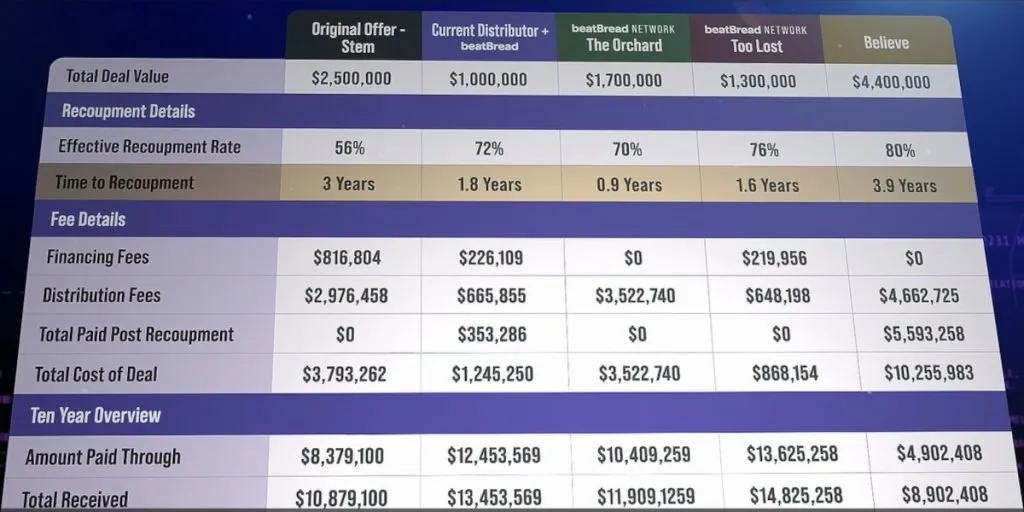The beatBread Deal Comparison Tool dashboard, which compares proposed terms from labels, distributors, and others. Photo Credit
beatBread has launched a “Deal Comparison Tool” designed to enable artists and indies to weigh offers’ long-term value and secure the best available terms.
The indie-focused funding platform reached out with word of its Deal Comparison Tool, billed as a means of accessing side-by-side breakdowns of proposed agreements. Those deals can, of course, come from beatBread itself, which says it’s wrapped approximately 1,500 advances since launching in 2020.
But artists and indies can also use the Deal Comparison Tool to weigh terms floated by various distributors, major labels, and, against the backdrop of continued song-rights sales, different companies yet.
That includes beatBread partners and straight competitors – with Deal Comparison Tool users having “often” opted for third-party offers during the beta test.
“And that’s OK,” weighed in beatBread co-founder and CEO Peter Sinclair. “Our mission is to empower artists and independent labels, and to become the place where smart deal choices are made.”
According to an introductory video, the one-stop tool compiles each deal’s total value, fee specifics, and possible recoupment timetable.
Regarding the latter, the Deal Comparison Tool can adjust figures based on music’s anticipated commercial performance (whether “low case,” “expected case,” or “high case”), the video shows. Theoretically, the information will then help talent and indies make more informed dealmaking decisions.
Per Too Lost-partnered beatBread, the Deal Comparison Tool’s beta saw around 60% of artists (some with seven-figure contracts before them) and label owners (fielding up to $100 million proposals) ultimately select “a deal other than their original offer.”
“In the worst cases,” the company elaborated, “beatBread’s beta test showed that some independent labels would most likely end up forced into a distress sale after a few years had they taken the seemingly best distribution or label JV offer in front of them.”
Amid a steady stream of indie-label sale announcements, that seldom-discussed angle is significant. And in a statement, the former Universal Music higher-up Sinclair emphasized the Deal Comparison Tool’s perceived benefits for “[e]ven the most sophisticated executives.”
“Even the most sophisticated executives are sometimes deceived by ‘headline terms’ in a deal,” the beatBread CEO said. “The Deal Comparison Tool gives artists and labels the chance to cut through the fog and get true understanding of a deal because it links the key terms of a contract to a real range of probable outcomes as music is released and continues to perform.”

